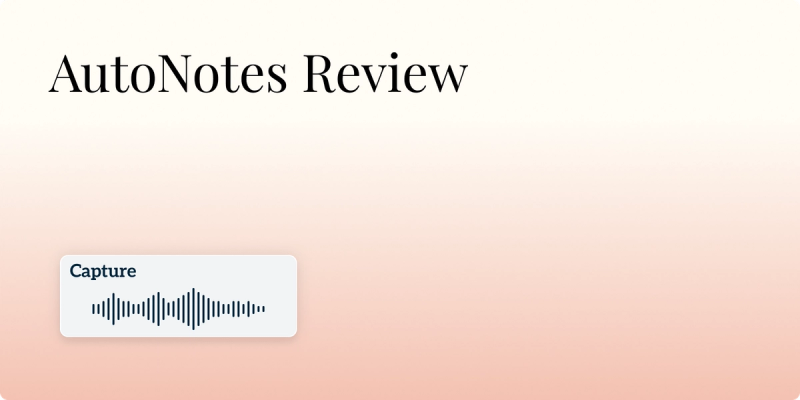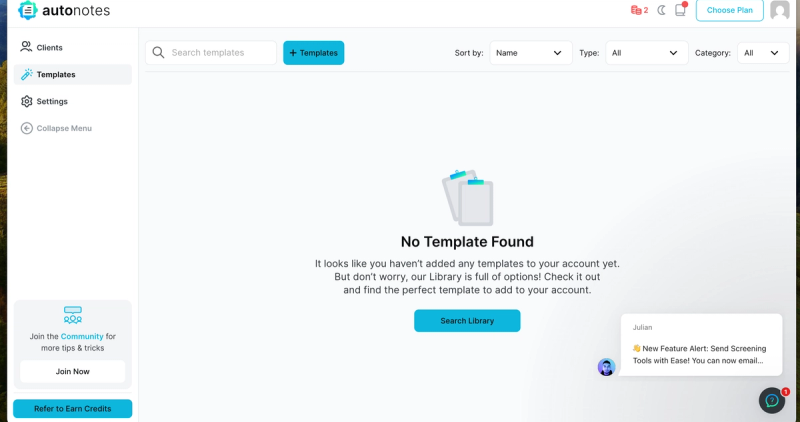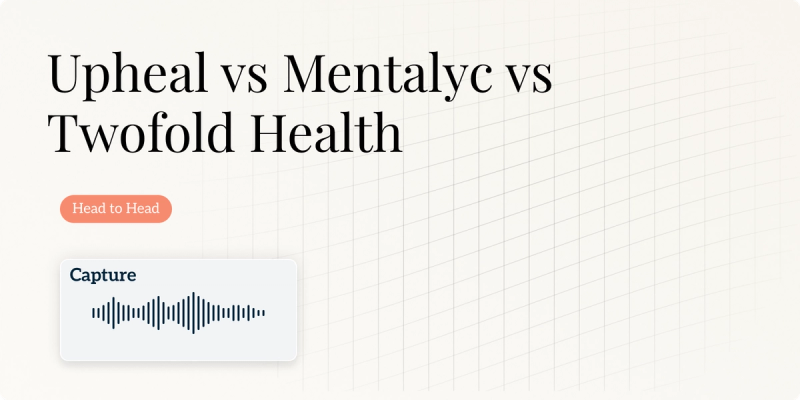
Autonotes AI Review: Detailed Review for 2026

Key Takeaways
- Redaction‑first compliance model: AutoNotes drafts notes in seconds, yet its Terms of Service forbid uploading protected health information (PHI), and the company will not sign a Business Associate Agreement (BAA). Every identifier—names, dates of birth, MRNs—must be stripped before text or audio is processed, shifting HIPAA liability to the clinician.
- Scalability costs and workflow friction: A credit‑based solo tier (125 / 300 / unlimited sessions) looks inexpensive at low volume but escalates sharply as caseloads grow; inserting drafts into an EHR still relies on copy‑paste or a Chrome extension, and there is no native mobile or offline app today.
- Modest social proof and middling support scores: Public feedback remains thin—10 G2 reviews averaging 4.4/5—and customer‑support quality is rated 8.2, below several peers. Many expanding practices ultimately explore more mature HIPAA-certified platforms, such as Twofold Health, when they outgrow AutoNotes’ guardrails.
How AutoNotes Transforms Therapist Documentation
AutoNotes launched in 2022 to tackle the paperwork burden that consumes an estimated 35–40 % of a therapist’s week. Three years on, the company advertises 65,000+ clinicians, 8,000+ practices, and 3.5 million sessions completed—a respectable footprint for a niche vertical product.
Its value proposition is straightforward: turn typed prompts, live dictation, or full‑session recordings into structured progress notes, treatment plans, and summaries in under 60 seconds so clinicians can reclaim billable time.
What AutoNotes Delivers: Key Features
Multi‑Modal Capture & Transcription
The product offers three input modes—quick text, browser‑based dictation (Essential tier), and asynchronous audio upload (Premium )—all routed through the same language‑model pipeline. Supported templates include SOAP, DAP, BIRP, PIE, CBT, EMDR, group notes, and a drag‑and‑drop custom builder.
Turnaround times in vendor demos average 20–40 seconds for text or dictation and roughly two minutes for a 50‑minute recording, after which clinicians see both a verbatim transcript and an editable draft.
Template Depth & “Smart Defaults”
Built‑in templates cover individual, family, and group modalities. Clinicians can lock phrasing, reuse snippets, and carry forward goals or diagnoses so the golden thread stays intact between intake and discharge.
Treatment‑Plan Automation & Screeners
Premium tier users receive PHQ‑9, GAD‑7, and other assessments that pipe scores directly into auto‑versioned treatment plans—handy for payer audits.
EHR Workflow
Instead of an API, AutoNotes ships a Google Chrome extension that opens inside any text field, letting users paste formatted output into SimplePractice, TherapyNotes, or Epic Community Connect. It’s quick for solos but introduces extra clicks and no audit trail for large teams.
Autonotes Pricing Deep Dive
Tier (monthly billing) | Price / mo | Session credits | Typical fit |
|---|---|---|---|
Basic | Free | 1 audio / day + 30 text notes | Students, trial |
Essential | $25 | 125 | ≤ 25 sessions/wk; no recordings |
Premium | $49 | 300 | Audio recordings, screeners |
Ultimate | $99 | Unlimited | High‑volume clinicians |
Group | Custom | Custom | Multi‑site orgs |
Last verified January 2026
The structure keeps entry costs low but forces providers with 30‑plus weekly sessions onto higher plans or constant credit monitoring—a hidden administrative chore many clinicians hope to eliminate over time.
Autonotes Compliance, Privacy & Legal Posture
PHI prohibition and no BAA: AutoNotes’ Terms explicitly state that users “are not permitted to upload or submit any personal health information,” adding that the vendor “does not believe it is a covered entity under HIPAA.”
Redaction overhead: The FAQ reiterates that all 18 HIPAA identifiers must be removed prior to upload.
Warranty disclaimers: The End‑User License Agreement supplies the product “AS IS,” disclaims warranties of accuracy or usefulness, and limits liability in the event of data loss or billing errors.
For solo clinicians practicing under state rules that tolerate de‑identified drafting, these constraints may be acceptable. For payer‑panel practices, hospital affiliates, or organizations whose compliance programs insist on a signed BAA, the AutoNotes model is often a non‑starter.
User Experience & Sentiment
Onboarding: Sign‑up is self‑service, with a 24‑hour Premium trial that showcases dictation and recording without a credit card.
Interface: The web UI is clean and fast, though user reviews note dropdown lag and occasional scroll glitches.
Accuracy: G2 reviewers praise transcription quality but say the AI can default to “generic” language in complex trauma sessions, requiring edits for nuance.
Support: G2’s comparison tables give AutoNotes a quality‑of‑support score of 8.2, lower than several category peers.
With only 10 public reviews at press time, broad reliability across diverse settings is still hard to judge.

Roadmap & Community Signals
The vendor’s community forum lists a native mobile app, direct EHR write‑backs, and multilingual generation (Spanish first) as “planned.” None carry target release dates. Until those land, clinicians needing offline capture or audit‑grade integrations must rely on current browser‑only workflows.
Autonotes Limitations to Weigh
- Regulatory burden: Strict redaction requirements and the absence of a BAA place full HIPAA liability on the clinician.
- Scalability friction: Credit ceilings, browser‑only operation, and manual EHR insertion add overhead as caseloads or clinician headcount rises.
- Thin ecosystem: Limited third‑party reviews, sub‑optimal support scores, and no mobile or offline option may give risk‑averse organizations pause.
Autonotes Strategic Fit
AutoNotes excels as a redaction‑friendly, browser‑based scribe for solo therapists with modest volumes who prize template flexibility over enterprise‑grade integrations. When practices mature—adding providers, insurer contracts, or higher compliance stakes—many leaders begin evaluating fuller‑featured, HIPAA‑certified platforms. Twofold Health, for example, is frequently cited in clinician forums for its flat‑rate unlimited notes, signed BAA, and broader mental‑health operating‑system vision.
Adaptive Voice Recognition | v |
|---|---|
Customizable Note Structures | |
EHR System Integration | In Pro Tier ($99/month) |
Data Privacy Compliance | ? |
Multilingual Capability | ? |
Encryption and Access Controls | |
HIPAA Compliance | |
User Interface Customization | |
Dedicated Customer Support |
Final Verdict
AutoNotes AI is a capable first step toward AI‑assisted documentation, but its compliance model and credit caps limit long‑term scalability. If you can confidently de‑identify every session—and your caseload stays under 20 sessions per week—the Essential or Premium tiers can reclaim genuine clinical hours.
Should your roadmap include multi‑provider growth, enterprise integrations, or end‑to‑end HIPAA coverage, it may be prudent to explore more comprehensive solutions—Twofold Health is one option frequently raised by clinicians seeking a future‑proof path.
Note: The information provided in this article is based on data available as of December 2025. Features and pricing are subject to change. Please consult the respective company websites for the most current information.
Disclaimer: This article is for informational purposes only and does not constitute legal or medical advice. Always consult professional guidelines and regulatory bodies for specific compliance requirements.
Frequently Asked Questions
ABOUT THE AUTHOR
Gal Steinberg
Co-founder
Reduce burnout,
improve patient care.
Join thousands of clinicians already using AI to become more efficient.

Sunoh AI Review (2026): Features, Pricing, Pros & Cons
Explore the pros and cons of Sunoh AI medical scribing features.

Upheal vs Mentalyc vs Twofold Health — a detailed, 2026 ‑ready guide
A clinician‑tested comparison of Upheal, Mentalyc, and Twofold Health covering price, note quality, HIPAA/BAA, consent, retention, templates, languages, mobile apps, and who each is best for - updated January 2026.

AI Scribe Discount: A Verified AI Medical Scribe Promo Code You Can Use Today
Looking for an AI scribe discount? Use Twofold’s AI medical scribe promo code TWOFOLD30 for $30 off annual plans—your verified ai scribe coupon code, plus pricing and features.

